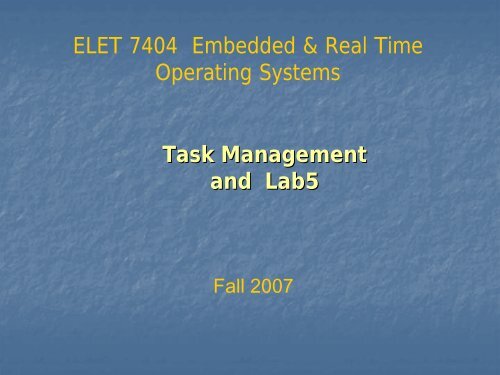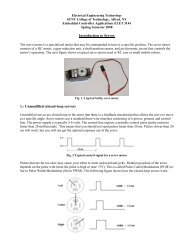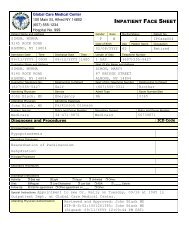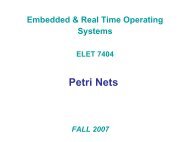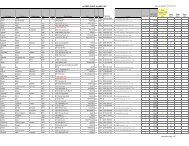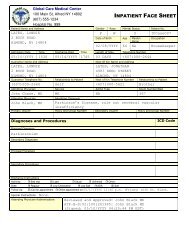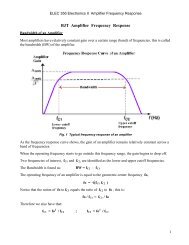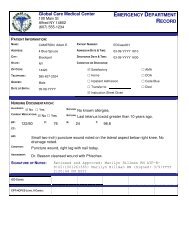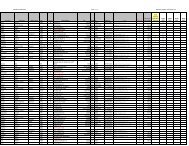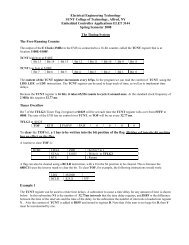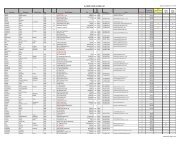Task Management and Lab 5
Task Management and Lab 5
Task Management and Lab 5
Create successful ePaper yourself
Turn your PDF publications into a flip-book with our unique Google optimized e-Paper software.
ELET 7404 Embedded & Real Time<br />
Operating Systems<br />
<strong>Task</strong> <strong>Management</strong><br />
<strong>and</strong> <strong>Lab</strong>5<br />
Fall 2007
<strong>Task</strong> Code Rules<br />
• Must be an infinite loop<br />
• for(;;) { }<br />
• while(1) { }<br />
• Must have its OWN STACK space setup in the<br />
beginning of code by the use of OS_STK<br />
• Must call a service at the bottom of the infinite loop
<strong>Task</strong> Structure<br />
Void Your<strong>Task</strong> (void *pdata)<br />
{<br />
for (;;) {<br />
/* USER CODE */<br />
Call one of uC/OS-II’s services:<br />
OSFlagPend();<br />
OSMboxPend();<br />
OSQPend();<br />
OSSemPend();<br />
OS<strong>Task</strong>Suspend(OS_PRIO_SELF);<br />
OSTimeDly();<br />
OSTimeDlyHMSM();<br />
}<br />
/* USER CODE */<br />
}
Creating a <strong>Task</strong><br />
OS<strong>Task</strong>Create ( )<br />
OS<strong>Task</strong>CreateExt ( )
Idle <strong>Task</strong><br />
<br />
Always created<br />
<br />
Created by OSInit()<br />
<br />
Always the lowest priority, OS_LOWEST_PRIO<br />
<br />
The idle task can never be deleted by application<br />
software
OS<strong>Task</strong>Create()<br />
Requires four arguments:<br />
• <strong>Task</strong> : pointer to the task code<br />
• Pdata: pointer to an argument that is passed to<br />
your task when it starts executing<br />
• Ptos: pointer to the top of the stack that is assigned<br />
to the task<br />
• Prio: is the desired task priority
OS<strong>Task</strong>Create(): Example<br />
OS<strong>Task</strong>Create(TestStart, , (void *)0, &TestStartStk[0], 0);<br />
/* Here the stack grows from low to high memory */<br />
OS<strong>Task</strong>Create(TestStart, , (void *)0,<br />
&TestStartStk[TASK_STK_SIZE<br />
TASK_STK_SIZE-1], 0);<br />
/* Here the stack grows from high to low memory */
OS<strong>Task</strong>CreateExt()<br />
• Offers more flexibility but has more overhead<br />
• Requires 9 arguments<br />
• First four, same as OS<strong>Task</strong>Create()<br />
• 5 TH argument: Id – unique identifier<br />
• 6 TH argument: Pbos – pointer to tasks bottom of stack<br />
TH argument: Stk_size – specifies stack size in number<br />
of elements.<br />
• 7 TH<br />
TH argument: Pext – pointer to a user-supplied supplied data<br />
area that can be used to extend the OS_TCB of the task<br />
• 8 TH<br />
TH argument: Opt – specifies whether stack checking is<br />
allowed, whether the stack will be cleared, <strong>and</strong> whether<br />
floating point operations are performed by the task,<br />
among others<br />
• 9 TH<br />
TCB -<strong>Task</strong> Control Block
Note about the TCB (<strong>Task</strong> Control Block)<br />
When a task is created, it is assigned a <strong>Task</strong> Control Block<br />
(OS_TCB) . This TCB is used to maintain the state of a task<br />
when it is preempted.<br />
The TCB resides in RAM<br />
Note about the opt argument<br />
In order to perform stack checking on a task, the<br />
OS_TASK_OPT_STK_CHK flag in the opt argument must<br />
be set<br />
Also the stack must contain zeros, then use the function<br />
OS_TASK_OPT_STK_CLR
OS<strong>Task</strong>CreateExt( ( ): Example<br />
OS<strong>Task</strong>CreateExt(<strong>Task</strong>Start, , (void *)0, ptos, , TASK_START_PRIO,<br />
TASK_START_ID, pbos, , size, (void *)0,<br />
OS_TASK_OPT_STK_CHK | OS_TASK_OPT_STK_CLR);<br />
Note for lab 5:<br />
OS<strong>Task</strong>CreateExt(STKWrit<strong>Task</strong>, , (void *)0, (OS_STK *)&STKWrit<strong>Task</strong>Stk[0],<br />
5, 5, (OS_STK *)&STKWrit<strong>Task</strong>Stk[100-1], 1], 100, (void *)0,<br />
OS_TASK_OPT_STK_CHK | OS_TASK_OPT_STK_CLR);
Notes about <strong>Lab</strong> 5: check stack space on a task<br />
To check space on a task you should:<br />
• Set OS_TASK_CREATE_EXT to 1 in OS_CFG.H<br />
• Set the opt argument in OS<strong>Task</strong>CreateExt( ) to<br />
OS_TASK_OPT_STK_CHK | OS_TASK_OPT_STK_CLR
Notes about <strong>Lab</strong> 5: check stack space on a task<br />
Stack checking allows to reduce the amount of RAM<br />
needed by the application by not overallocating stack space<br />
OS<strong>Task</strong>StkChk( ) provides this information<br />
• To perform stack checking, microC requires that the<br />
stack be filled with zeros when the stack is created<br />
• Also micro C needs to know the location of the bottom<br />
of the stack <strong>and</strong> the size of the stack you assigned to<br />
the task<br />
• These two values are stored in the task’s OS_TCB<br />
when the task is created but only if the task was created<br />
with OS<strong>Task</strong>CreateExt( )
Functions in OS_TASK.C<br />
<strong>Task</strong>s<br />
• Change Priority of a <strong>Task</strong> [ OSPrioChange() ]<br />
• Create a <strong>Task</strong> [ OS<strong>Task</strong>Create() ]<br />
• Create a <strong>Task</strong> (Extended Version) [ OS<strong>Task</strong>CreateExt() ]<br />
• Delete a <strong>Task</strong> [ OS<strong>Task</strong>Del() ]<br />
• Request that a <strong>Task</strong> Delete Itself [ OS<strong>Task</strong>DelReq() ]<br />
• Resume a Suspended <strong>Task</strong> [ OS<strong>Task</strong>Resume () ]<br />
• Stack Checking [ OS<strong>Task</strong>StkChk() ]<br />
• Suspend a <strong>Task</strong> [ OS<strong>Task</strong>Suspend() ]<br />
• Query a <strong>Task</strong> [ OS<strong>Task</strong>Query() ]
<strong>Task</strong><br />
• Can be created prior to multitasking or created by another<br />
task<br />
• At least one task must be created before multitasking<br />
begins<br />
• <strong>Task</strong> Counter<br />
•OS<strong>Task</strong>Ctr<br />
• Counter is incremented in OS<strong>Task</strong>Create() <strong>and</strong><br />
OS<strong>Task</strong>CreateExt() <strong>and</strong> decremented in<br />
OS<strong>Task</strong>Del()<br />
- To display the #tasks running:<br />
printf("#<strong>Task</strong>s:%2u\n", OS<strong>Task</strong>Ctr);
<strong>Task</strong> Stacks<br />
• Each task must have its own stack space<br />
• Stack must be declared as being of type OS_STK<br />
• Stack must consist of contiguous memory locations<br />
• Allocate stack space statically (compile time) or<br />
dynamically (run-time)
Static stack<br />
Static OS_STK My<strong>Task</strong>Stack[stack_size];<br />
OR<br />
OS_STK My<strong>Task</strong>Stack[stack_size];<br />
• Stack can grow from low to high memory or<br />
vice versa
Configuration File<br />
• You will have to modify a configuration file<br />
to enable or disable features of<br />
MicroC/OS<br />
/OS-II<br />
• OS_CFG.H<br />
• Initially this file is named, os_cfg_r.h while it<br />
isn’t t being used<br />
• Rename os_cfg.r.h to OS_CFG.H to get started
Time <strong>Management</strong><br />
• Time <strong>Management</strong><br />
• Found in OS_TIME.C<br />
• OSTimeDly()<br />
• Enter a delay in clock ticks<br />
• OSTimeDlyHMSM()<br />
• Enter a delay in hours, minutes, seconds,<br />
milliseconds<br />
• OSTimeDlyResume()<br />
• Resumes a task that has been delayed by<br />
OSTimeDly() or OSTimeDlyHMSM()<br />
• OSTimeGet()<br />
• Gets the current value of the system clock<br />
• OSTimeSet()<br />
• Sets the desired value of the system clock in ticks
Kernel Core<br />
•OS_CORE.c<br />
• Priority Resolution Table<br />
• Initialization [ OSInit() ]<br />
• Interrupt Subroutine enter <strong>and</strong> exit<br />
• Scheduler (enable <strong>and</strong> disable)<br />
• Start Multitasking [ OSStart() ]<br />
• System Tick<br />
• Get version [ OSVersion() ]<br />
• Statistics <strong>Task</strong><br />
• Create Idle <strong>Task</strong><br />
• Idle <strong>Task</strong>
About LAB 5:<br />
Stack Space with MicroC/OS-II<br />
• Displaying the actual stack space for a new task<br />
that displays its own stack space<br />
• Create a new task with the lowest priority that<br />
displays the used stack space for this new task
void STKWrit<strong>Task</strong>()<br />
{<br />
char x[2];<br />
INT32U stk_size;<br />
OS_STK_DATA stk_data;<br />
for(;;)<br />
{<br />
OSTimeDly(8000);<br />
// period= 8000mS<br />
// LAB5: Using service to check stack space on this task+ stk_data.OSFree = total<br />
OS<strong>Task</strong>StkChk(OS_STAT_PRIO, &stk_data); stk_size = stk_data.OSUsed ;<br />
itoa(stk_size,x);<br />
DispClrScr();<br />
DispStr(0,x);<br />
}<br />
}


